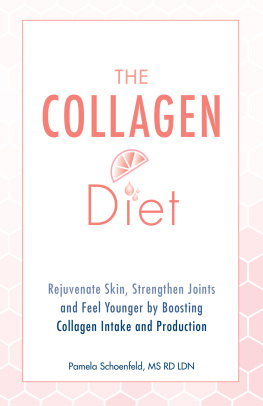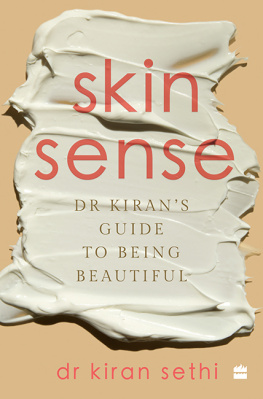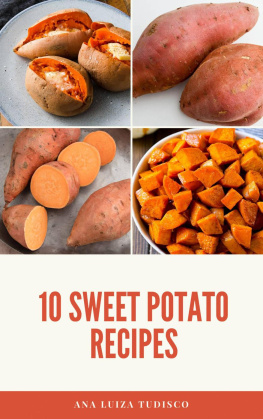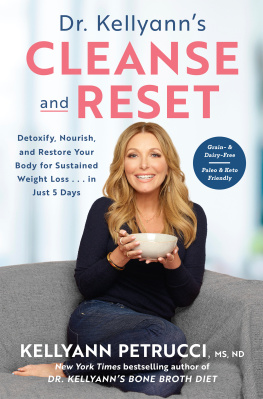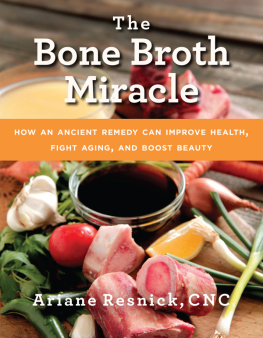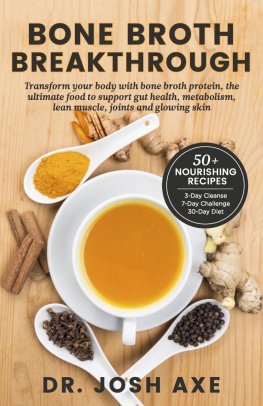
THE
COLLAGEN
Diet
Rejuvenate Skin, Strengthen Joints
and Feel Younger by Boosting
Collagen Intake and Production
Pamela Schoenfeld, MS, RD, LDN

Text copyright 2018 Pamela Schoenfeld. Design and concept copyright 2018 Ulysses Press and its licensors. All rights reserved. Any unauthorized duplication in whole or in part or dissemination of this edition by any means (including but not limited to photocopying, electronic devices, digital versions, and the internet) will be prosecuted to the fullest extent of the law.
Published in the United States by:
Ulysses Press
P.O. Box 3440
Berkeley, CA 94703
www.ulyssespress.com
ISBN: 978-1-61243-858-0
Acquisitions: Casie Vogel
Managing editor: Claire Chun
Editors: Shayna Keyles, Lauren Harrison
Proofreader: Renee Rutledge
Front cover design: Ashley Prine
Honeycomb artwork: Lesik Vitaliy/shutterstock.com
Production: Jake Flaherty
NOTE TO READERS: This book has been written and published strictly for informational and educational purposes only. It is not intended to serve as medical advice or to be any form of medical treatment. You should always consult your physician before altering or changing any aspect of your medical treatment and/or undertaking a diet regimen, including the guidelines as described in this book. Do not stop or change any prescription medications without the guidance and advice of your physician. Any use of the information in this book is made on the readers good judgment after consulting with his or her physician and is the readers sole responsibility. This book is not intended to diagnose or treat any medical condition and is not a substitute for a physician.
This book is independently authored and published and no sponsorship or endorsement of this book by, and no affiliation with, any trademarked brands or other products mentioned within is claimed or suggested. All trademarks that appear in ingredient lists and elsewhere in this book belong to their respective owners and are used here for informational purposes only. The authors and publishers encourage readers to patronize the quality brands mentioned and pictured in this book.
Contents
PART 1
WHY CARE ABOUT COLLAGEN?
Introduction
Boneless, skinless chicken breasts, skinless fish fillets, and lean meats have been the healthy choices of diet-conscious individuals for more than three decades. Most of my clients in my nutrition practice tell me that they eat only skinless poultry, even removing the skin from a store-bought rotisserie chicken, anticipating that I will almost certainly commend them for their healthy choice.
When I tell them that the skin theyre tossing in the garbage (or giving to their dog) actually contains a valuable nutrient that is difficult to obtain from other foods, a puzzled look comes over their faces. They ask, doesnt removing the skin do away with unwanted fat and calories? While this can be the case, the skin of the chicken contains an abundance of collagen protein that can support the health of their own skin, bones, and joints. And chicken fillets, like all skinless meats, only contain a very small amount of collagen protein.
Often, clients admit that they find it difficult to eat chicken skin because they simply dont like it. I agree that it is difficult at first to enjoy eating something that youve almost never eaten beforeeven the popular fried chicken nuggets targeted at children have always been stripped of the skin. I persistently suggest they might want to try roasting some tasty marinated chicken wings or making a delicious homemade soup with the leftovers from a rotisserie chicken. And once I educate them on the many ways their bodies can benefit from the collagen protein supplied by the parts of the chicken they previously discarded, theyre eager to learn additional ways to get collagen in their diets.
Why do I encourage my clients to eat the chicken skin along with the meat? Many informed nutritionists now understand that there are benefits to eating the skin that covers the breast, wings, legs, and thighs, together with all of the other parts of the chicken. My personal practice is to first enjoy the crispy skin of a freshly roasted chicken (after discarding the majority of fat that drips into the pan), followed by eating a leg and thigh. What better way to have a delicious meal and get the health benefits from the collagen protein found almost exclusively in the skin, bones, and connective tissues of the chicken, and for that matter, any other animal?
Why should you be concerned about getting plenty of collagen in your diet? The simplest answer is that our bodies contain a lot of it! Collagen is a structural protein that makes up almost one-third of our tissues, making it a major player in the human bodyessential for our joints, cartilage, and tendons; our bones, skin, hair, nails, and teeth; and even our blood vessels and eyes. All of these tissues contain one or more types of collagen. Collagen synthesis, or the formation of new collagen, is absolutely required by all of these vital tissues, especially during growth and the repair and recovery periods following injury or disease.
Perhaps more importantly, collagen gives these tissues the elasticity, flexibility, and strength needed to prevent degeneration in the first place. With less breakdown and more regeneration, skin stays more youthful, hair resists breakage, bones are more resilient, joints better resist wear and tear, and nails grow longer and stronger. Often called the glue that holds the body together, adequate, high-quality collagen keeps us from becoming floppy, leaky, and creaky! Consuming collagen is an important way to support the integrity of the collagen that the body manufactures.
Consuming collagen protein also increases the supply of amino acids, or protein building blocks, that our bodies need to deal with environmental toxins and synthesize critical antioxidants. Additionally, exciting new research demonstrates collagen protein may help with weight management, sleep problems, diabetes, high blood pressure, inflammation, and even digestive issues. And dietary collagen protein appears to enhance muscle growth, reduce pain and inflammation, and support joint integrity, which is good news whether you are a competitive or even a weekend athlete. It truly is a remarkably versatile substance that can improve many common health conditions and elevate overall wellness and vitality.
Because our bodies can synthesize collagen using the amino acids found in other proteins that we eat, consuming collagen protein is technically optional. Yet consuming dietary collagen offers a myriad of health benefits in part because it stimulates the body to make more of its own collagen, forestalling wrinkles, arthritis, muscle and bone loss, and general bodily wear and tear.
My Own Collagen Protein Experience
When you think of collagen protein, what first comes to your mind? Perhaps, as I once did, you initially think of stronger nails and more youthful skin. Thats just the beginning. My own understanding of collagen protein and what it can do has evolved substantially over the past few decades, along with the leading research that is uncovering more and more benefits of including collagen protein in our diet.
As a teenager, I bought into the Knox Unflavored Gelatin advertisements in the 1970s that promised stronger, longer fingernails by consuming just one packet of their gelatin drink mix per day. Gelatin is made from the skin and bones of animals and is almost pure collagen protein. It is also a main ingredient in products like Jell-O. My fingernails had always been prone to splitting and breaking, and the various nail treatments I brushed on never seemed to help. Knox Gelatin seemed like the answer to getting those long, strong nails I envied in my high school girlfriends. So I conducted my own dietary experiment by consuming Knox, hoping to see quick and measurable results. Unfortunately, not finding much of a difference after a few weeks, I prematurely dismissed it as a beauty fad and resigned myself to having slow-growing, weak nails. (Plus, those individual packages of gelatin were somewhat pricey for my hard-earned money!) Yet had I patiently stuck with this beauty habit long-term, I probably would have seen results, as I do now. Ill discuss how gelatin can improve nails in .
Next page
